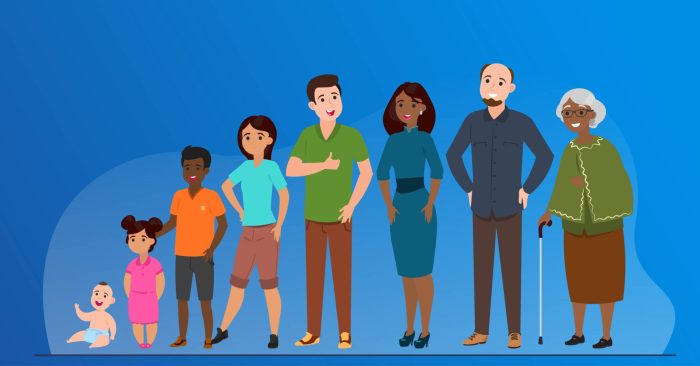Life span human development 9th edition – Life Span Human Development, 9th Edition, unveils a comprehensive exploration of human development across the entire life span. This seminal work delves into the physical, cognitive, social, and emotional transformations that shape individuals from infancy to old age.
With a focus on the latest research and theoretical advancements, the 9th edition provides a cutting-edge understanding of human development, emphasizing the dynamic interplay between biological, psychological, and social factors.
Overview of Life Span Human Development, 9th Edition

The ninth edition of “Life Span Human Development” by Santrock provides a comprehensive overview of the field, from conception to late adulthood. It emphasizes the interconnectedness of physical, cognitive, social, and emotional development across the life span. This edition includes updated research and new insights on emerging topics such as epigenetics, the microbiome, and positive psychology.
Key Theoretical Perspectives
The study of human development is guided by several key theoretical perspectives, including:
- Psychoanalytic Theory:Focuses on the role of unconscious processes and early childhood experiences in shaping personality and development.
- Behaviorism:Emphasizes the role of learning and environmental influences in shaping behavior.
- Cognitive Theory:Examines the development of cognitive processes, such as memory, attention, and problem-solving.
- Social Cognitive Theory:Combines elements of behaviorism and cognitive theory, highlighting the role of social interactions and self-regulation in development.
- Ecological Systems Theory:Considers the influence of multiple levels of the environment on development, from the microsystem (immediate surroundings) to the macrosystem (cultural and societal factors).
Research Methods in Human Development, Life span human development 9th edition
Researchers use various methods to study human development, including:
- Observational Methods:Involve observing individuals in natural or laboratory settings to collect data on their behavior and development.
- Experimental Methods:Involve manipulating variables to examine their effects on development.
- Longitudinal Studies:Track the same individuals over time to examine developmental changes.
- Cross-Sectional Studies:Compare different age groups at a single point in time to examine developmental differences.
- Qualitative Methods:Collect data through interviews, focus groups, or other methods to gain insights into individuals’ experiences and perspectives.
Physical Development Across the Life Span
Physical development involves significant changes in size, shape, and function throughout the life span, including:
- Prenatal Development:Occurs from conception to birth and involves rapid growth and differentiation of organs and tissues.
- Infancy and Early Childhood:Involves rapid growth in height and weight, as well as the development of motor skills and coordination.
- Middle and Late Childhood:Characterized by gradual growth in height and weight, along with the development of secondary sexual characteristics.
- Adolescence:Involves a growth spurt and the development of adult physical characteristics.
- Early and Middle Adulthood:Physical changes are relatively stable, but gradual decline in some physical functions begins.
- Late Adulthood:Involves significant physical changes, including decreased muscle mass, bone density, and cognitive function.
Cognitive Development Across the Life Span
Cognitive development involves changes in intellectual abilities, problem-solving skills, and memory throughout the life span, including:
- Sensorimotor Stage (Birth to 2 Years):Infants learn through sensory experiences and motor actions.
- Preoperational Stage (2 to 7 Years):Children develop language skills and symbolic thinking, but struggle with logical reasoning.
- Concrete Operational Stage (7 to 11 Years):Children develop logical reasoning skills and can apply them to concrete problems.
- Formal Operational Stage (11 Years and Up):Adolescents develop abstract reasoning skills and can think about hypothetical situations.
- Cognitive Changes in Adulthood:Cognitive abilities generally remain stable in early adulthood but may decline in late adulthood.
Expert Answers: Life Span Human Development 9th Edition
What are the key theoretical perspectives in human development?
Life Span Human Development, 9th Edition, explores various theoretical perspectives, including psychoanalysis, behaviorism, cognitive-developmental theory, and social learning theory.
How does research contribute to our understanding of human development?
The book highlights the importance of research methods, such as longitudinal studies, cross-sectional studies, and experimental designs, in advancing our knowledge of human development.
What factors influence physical development across the life span?
Life Span Human Development, 9th Edition, examines the impact of genetics, environment, and nutrition on physical growth and development.